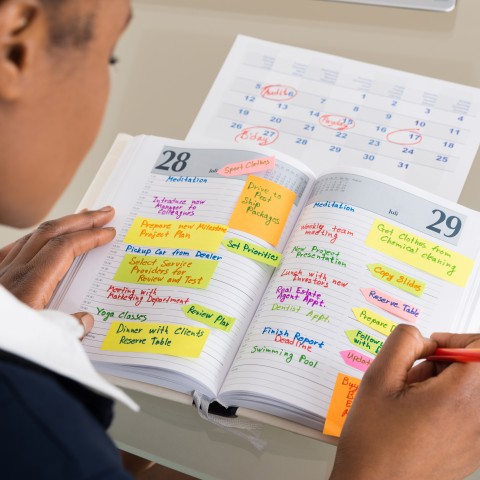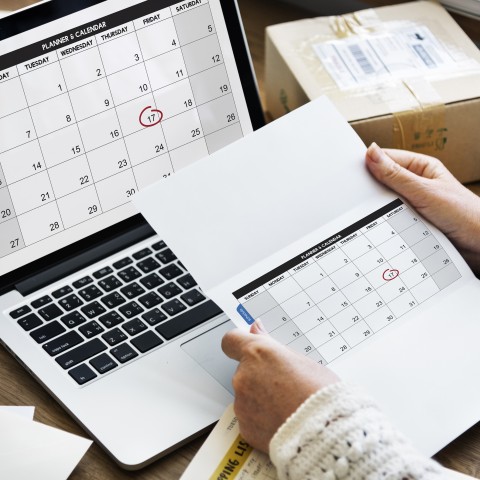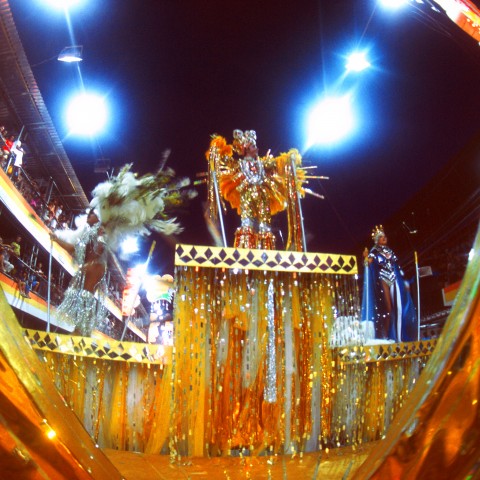
Do you sometimes wish the weekends had more days? When are your next vacations? Do you know your best friend’s birthday? If you want to answer any of those questions in Portuguese, you first need to learn how to talk about dates in Portuguese. Then, you’ll be able to do many more things, like making plans, arranging meetings and celebrating anniversaries!
Talking about dates is a part of everyday interactions. Every time you need to solve some bureaucracy, you need to write your date of birth or indicate today’s date. When making plans with your friends, you better know the days of the week to avoid mix-ups. And if you are a history buff, then you know dates are a must-know!
Today, you will learn how to write the date in Portuguese, as well as how to talk about it. And of course, if we are talking about dates, we also need to talk about numbers, so you will see plenty of them in this article. To make sure you know how to use all of that properly, we will also go through common phrases related to Portuguese dates and times, including useful questions and answers.
If you are ready to celebrate important dates with your family, friends or significant other, or anxious to learn how to book appointments and meetings in Portuguese… let’s get started!

Learn how to talk about your busy schedule in Portuguese!
 Table of Contents
Table of Contents
- How to Tell the Date
- How to Say the Days
- How to Say the Months
- How to Say the Years
- Fix the Date of Appointments in Portuguese
- Must-Know Phrases to Talk about Dates
- Continue Learning Portuguese With PortuguesePod101
1. How to Tell the Date
Depending on where you are from, you might be used to a different way of telling the date when compared to Brazil or Portugal. But once you get used to the correct format of Portuguese dates, things are straightforward enough.
2 – Format of Dates in Portuguese: Day/Month/Year
Before anything else, let’s take a look at the basic Portuguese vocabulary related to dates.
| Dia | “Day” |
| Mês | “Month” |
| Ano | “Year” |
| Semana | “Week” |
| Dia da semana | “Weekday” |
| Fim de semana Final de semana | “Weekend” |
| Data | “Date” |
When writing or talking about dates in Portuguese, the usual order is Day, Month and Year. If you are filling a form, you will usually see the date using slashes as separators: DD/MM/YY.
In more formal texts, it is normally written down in the same way it is said: day + de (“of”) + month + de (“of”) + year.
Here are some examples to make it clear:
- 07/09/1822 – Brazilian Independence Day
- 25 de abril de 1974 – Revolução dos Cravos (“Carnation Revolution” in Portugal)
- 12 de junho – Dia dos Namorados (“Valentine’s Day” in Brazil)
2 – Talking About Dates
Imagine you are in the doctor’s office, and she asks you what your date of birth is. In this case, you could simply answer using the format discussed above: day, month, year.
But in most situations, you’ll probably be using the date in the middle of a sentence. In those situations, there are some things to pay attention to:
- Preposition
- Use of the word dia (“day”)
- How to say the numbers
- Consider adding the day of the week
We will go point by point to make sure each item is clear.
1. Preposition
Take a look at the sentences below.
- Eu nasci em 15 de abril de 1995.
“I was born on April 15, 1995.”
- Eles se conheceram no dia 25 de dezembro.
Literally: “They met on the (day) 25th of December.”
- Eles viajarão em maio.
“They will travel in May.”
- Minha mãe nasceu em 1960.
“My mother was born in 1960.”
Did you notice what these sentences have in common? Hint: look at the preposition.
In Portuguese, before each date, we use the preposition em (“in”) or its contraction em + o = no (“in” + masculine definite article “the”).
2. Add the Word Dia
It’s very common to use the word dia (“day”) before the date if talking about a particular day.
- Eu tenho consulta no dia 14 [deste mês].
“I have an appointment on the (day) 14th [of this month].”
Just like in English, if you only say the day without any extra information, people will assume you are talking about the 14th of this month – or the next month, if we are already past the 14th.
Also note that dia is a masculine word. For this reason, you need to use no (contraction em + o) before the word dia.
3. How to Say the Numbers
In Portuguese, we almost always use cardinal numbers to talk about dates (both days and years). The only exception is the first day of each month, for which we use the ordinal number.
- Dia 24 (vinte e quatro) de janeiro.
“Day 24 (twenty-four) of January ”
- Dia 1º (primeiro) de abril – Dia da Mentira
“Day 1st (first) of April – April Fool’s day”
4. Add the day of the week
Sometimes it is a good idea to add the day of the week to make things clearer. For example, if you are scheduling a lunch with a friend or a job interview, you can say the day of the week before the date.
- Está marcado para quarta-feira, dia 02 de junho.
Literally: “It is scheduled for Wednesday, (day) 2nd of June.”
- Nos encontraremos na segunda-feira, dia 31 de outubro.
“We will meet on Monday, (day) 31st of October.”
When using the day of the week in front of the date, the preposition may change a bit. In most cases, you will still use the preposition em. However, it needs to agree on gender with the day of the week. We will look into the days of the week in-depth later in this article. For now, just remember that for feminine days of the week, the contraction is na (em + a), and for the masculine days, use the contraction no (em + o).
- ➜ Hint: when you can substitute the preposition for “in” or “on” in English, it is a safe bet to use em and its contractions.
In some other cases, you will need to use the preposition para (“to”).
- ➜ Hint: use para + article when you would use “to” in English.
3 – Mixing and Matching
Here are some of the several ways you can talk about dates using the information we’ve seen so far.
Talking about the day:
- Hoje é o dia 09.
“Today is the 9th.” or literally: “Today is the day 9.”
- Amanhã é domingo.
“Tomorrow is Sunday.”
- Nas quartas-feiras, ele vai ao teatro.
“On Wednesdays, he goes to the theater.”
Talking about the month:
- Estamos em maio.
“We are in May.” or “It is May.”
- Ele nasceu em novembro.
“He was born in November.”
Talking about the year:
- Estamos em 1845.
“We are in 1845.” or “It is 1845.”
- Eu me formei em 2020.
“I graduated in 2020.”
- No ano de 1990, muitas coisas aconteceram.
“In the year 1990, many things happened.”
And putting it together, we have:
- Hoje é dia 15 de novembro.
Literally: “Today is day 15 of November.”
- Estamos em julho de 2009.
“It is July 2009.” or literally: “We are in July of 2009.”
- Nos mudamos em 9 de março de 2019.
“We moved on March 9th, 2009.” or literally: “We moved on 9 of March of 2019.”

Tenho que terminar este projeto até dia 10, sexta-feira. (“I have to finish this project by 10th, Friday.”)
2. How to Say the Days

1 – The Numbers
The first thing you need to know to talk about days is the numbers from 1 to 31.
As mentioned before, in Portuguese we use cardinal numbers (the most basic form of the numbers). The only exception is when referring to the first day of the month. In this case, we use the ordinal form: primeiro (“first”).
| Number | 1 | 2 | 3 | 4 | 5 |
| Dia (“Day”) | Primeiro | Dois | Três | Quatro | Cinco |
| Number | 6 | 7 | 8 | 9 | 10 |
| Dia (“Day”) | Seis | Sete | Oito | Nove | Dez |
| Number | 11 | 12 | 13 | 14 | 15 |
| Dia (“Day”) | Onze | Doze | Treze | Quatorze | Quinze |
| Number | 16 | 17 | 18 | 19 | 20 |
| Dia (“Day”) | Dezesseis | Dezessete | Dezoito | Dezenove | Vinte |
| Number | 21 | 22 | 23 | 24 | 25 |
| Dia (“Day”) | Vinte e um | Vinte e dois | Vinte e três | Vinte e quatro | Vinte e cinco |
| Number | 26 | 27 | 28 | 29 | 30 | 31 |
| Dia (“Day”) | Vinte e seis | Vinte e sete | Vinte e oito | Vinte e nove | Trinta | Trinta e um |
- ➜ Listen to how you can pronounce the Numbers 1-10 and Numbers 11-100 with PortuguesePod101.

2 – Weekdays and Weekends
Now that you know how to say the days, what about the dias da semana (“days of the week”)?
You will see that it’s very easy to remember these days of the week in Portuguese, since they follow a simple format. For Monday through Friday, simply use the ordinal numbers! Since Sunday is the first day of the week, Monday is the second, and so on.
Let’s start with the weekdays, called dias úteis in Portuguese (literally meaning “useful days”).
| Dias úteis | Weekdays | Common abbreviation |
| segunda-feira | Monday | 2a |
| terça-feira | Tuesday | 3a |
| quarta-feira | Wednesday | 4a |
| quinta-feira | Thursday | 5a |
| sexta-feira | Friday | 6a |
Some things to note:
- Monday through Friday are feminine words in Portuguese.
- Days of the week are written in lower case in Portuguese, as shown in the table.
- Weekdays always end up with -feira (a word that comes from the Latin feria, and refers to days other than Sunday). Most romance languages use the Latin names for the days of the week, which make reference to pagan gods. Portuguese is an exception, due to Christian influence in Portugal.
- However, in everyday situations, it’s quite common to also say only the first part: segunda, terça, quarta, quinta and sexta.
Now, time to learn about the best part of the week: o fim de semana or o final de semana (“the weekend”). Note that both words below are masculine.
| Fim de semana | Weekend | Common abbreviation |
| sábado | Saturday | sab. |
| domingo | Sunday | dom. |
Sábado comes from the Sabbath. Domingo comes from the latin Dominicus (Dominica), meaning “the Lord’s Day”.

Dia 17 é uma quinta-feira. (“The 17th is a Thursday.”)
- ➜ Practice the pronunciation for the days of the week and superpower your Portuguese language learning with this free vocabulary list on Talking about the Days on PortuguesePod101.
3. How to Say the Months

Now, it’s time to get acquainted with the 12 months of the year. Notice that, just like the days of the week, months do not begin with a capital letter in Portuguese.
| Meses | Months |
| janeiro | January |
| fevereiro | February |
| março | March |
| abril | April |
| maio | May |
| junho | June |
| julho | July |
| agosto | August |
| setembro | September |
| outubro | October |
| novembro | November |
| dezembro | December |
Some other good-to-know Portuguese words related to months are:
- Trimestre (“Quarter”)
- Semestre (“Semester”)
- Estação, estações (“Season”, “seasons”)
And here are some examples of Portuguese sentences using the months:
- Meu aniversário é em dezembro.
“My birthday is in December.”
- Ele viajou em janeiro.
“He traveled in January.”
- A minha estação do ano favorita começa em março.
“My favorite season starts in March.”
- Nós nos formamos em julho de 2025.
“We graduated in July 2025.”

O verão começa no dia 21 de dezembro. (“Summer starts on December 21st.”)
- ➜ Do you want to hear how each month is pronounced in Portuguese? Head to this vocabulary list on Talking About Months in Portuguese.
4. How to Say the Years
We are back to numbers! When talking about years, there is a large variety of possible numbers, so we can’t cover each one individually. Luckily, the same format applies to most numbers – and consequently, to years.
We will cover some examples of how to pronounce some different years. If you need more information, you can always check our in-depth article on Numbers in Portuguese.
| Year | Portuguese Pronunciation |
| 753 | Setecentos e cinquenta e três |
| 1500 | Mil e quinhentos |
| 1712 | Mil setecentos e doze |
| 1989 | Mil novecentos e oitenta e nove |
| 2021 | Dois mil e vinte e um |
As you can see by the examples above, the years are pronounced as any other cardinal number. Unlike in English, in Portuguese, we do not combine smaller numbers. For example:
- 1912 can be pronounced as “nineteen twelve” in English. In Portuguese, that does not happen.
However, years in the 20th century can be shortened, as in the examples below:
- Nos anos 80… (“In the 80s…”)
- Ele lançou seu primeiro álbum em 95. (“He released his first album in 95.”)
And since we just mentioned centuries, here is another difference between Portuguese and English. In English, we use ordinal numbers followed by the word “century”. In Portuguese, we start with the word século (“century”) followed by the number. The number can be ordinal or cardinal, depending on the following rules.
- For numbers smaller than, and including, 10: the century is read as an ordinal number.
- For numbers above 10: the century is read as a cardinal number.
Traditionally, Roman numerals are used to talk about centuries. However, it is becoming increasingly more common to use our good old Arabic numbers. Let’s look at some examples.
- Os acontecimentos do século 10º (pronounced as décimo).
Os acontecimentos do século X (pronounced as décimo).
“The events of the 10th century.”
- No começo do século 21 (pronounced as vinte e um).
No começo do século XVIII (pronounced as vinte e um).
“At the beginning of the 21st century.”
- O Brasil foi colonizado no século 16 (pronounced as dezesseis).
O Brasil foi colonizado no século XVI (pronounced as dezesseis).
“Brazil was colonized in the 16th century.”
Finally, here are some extra sample sentences using years in Portuguese.
- 2020 foi um ano bissexto.
“2020 was a leap year.”
- Meu filho nasceu em 1999.
“My son was born in 1999.”
- Meus filmes preferidos são da década de 1980.
“My favorite movies are from the decade of 1980.”
- Se eu pudesse viajar no tempo, iria para os anos 30.
“If I could travel back in time, I would go back to the 30s.”
- Nos casamos em 2010. Já faz quase 15 anos!
“We got married in 2010. It’s been almost 15 years!”

Nos casamos em Abril de 2010, cinco anos atrás. (“We got married in April 2010, five years ago.”)
5. Fix the Date of Appointments in Portuguese
Now that you know how to talk about dates, it’s time to put it to use. There are many practical applications to dates in everyday life, like booking appointments and making plans.
Here are some important Portuguese words and phrases to do so:
- Consulta (“Appointment”)
- Agendamento (“Scheduling”, “appointment”)
- Reserva (“Booking”)
- Encontro (“Date”, romantic)
- Reunião (“Meeting”)
- Disponibilidade (“Availability”)
- Marcar (“To book”, “to schedule”)
- Agendar (“To schedule”)
- Gostaria de marcar uma consulta com o doutor na próxima semana.
“I would like to make an appointment with the doctor next week.”
- Vocês têm disponibilidade para o próximo mês?
“Do you have availability for the next month?”
- Qual é a data mais próxima para um agendamento?
“What is the closest date for an appointment?”
- Gostaria de agendar uma mesa para sexta-feira.
“I would like to schedule a table for Friday.”
- É possível reservar um quarto para duas pessoas para o fim de semana que vem?
“Is it possible to book a room for two people for next weekend?”
- Tenho um encontro amanhã.
“I have a date tomorrow.”
- Já podemos marcar a próxima reunião para Dezembro.
“We can already schedule the next meeting for December.”
A simple phone conversation to schedule an appointment with your doctor could go like this:
- Alô, boa tarde. Eu gostaria de marcar uma consulta com a doutora Ana. (“Hello, good afternoon. I would like to make an appointment with Dr. Ana. (feminine)”)
- Claro. Para que dia? (“Of course. For what day?”)
- Ela tem disponibilidade para a próxima semana? (“Does she have availability for next week?”)
- Não, a primeira data disponível é o dia 10 do mês que vem. (“No, the first available date is the 10th of next month.”)
- Dia 10 é uma quarta-feira? (“Is the 10th a Wednesday?”)
- Exatamente. Ela tem disponibilidade de manhã e de tarde. (“Exactly. She has availability in the morning and in the afternoon.”)
- Ok, então podemos marcar para o dia 10, às 11 horas. (“Okay, so we can schedule it for the 10th, at 11 o’clock.”)
- Perfeito. Está marcado. (“Perfect. It is scheduled.”)
- Obrigado! (“Thank you! (masculine)”)

Schedule your appointments like a pro!
6. Must-Know Phrases to Talk about Dates
1 – Talking about Past and Upcoming Dates
We have already seen several ways to say “the next” in the previous examples in this article. But to make it easier for you, here are all the ways to talk about the upcoming dates.
- Amanhã (“Tomorrow”)
- Depois de amanhã (“Day after tomorrow”)
- Na próxima semana, no próximo mês, no próximo ano (“Next week, next month, next year”)
- Na semana seguinte, no sábado seguinte (“The following week, the following Saturday”)
What about past dates? Here are the most important words and expressions to use:
- Ontem (“Yesterday”)
- Anteontem (“Day before yesterday”)
- Na semana passada, no mês passado, no ano passado (“Last week, last month, last year”)
- Dias atrás, meses atrás, anos atrás (“Days ago, months ago, years ago”)
2 – Important Everyday Phrases
In daily interactions, you will probably ask and answer questions related to dates in Portuguese. You will see that it isn’t too hard at all – especially once you learn these basic Portuguese phrases.
- Que dia é hoje? (“What day is today?”)
- Hoje é o dia 25. (“Today is the 25th.”)
- Que dia da semana é hoje? (“What day of the week is today?”)
- Hoje é quinta-feira. (“Today is Thursday.”)
- Quando as suas aulas começam? (“When do your classes start?”)
- Elas já começaram na semana passada. (“They already started last week.”)
- Quando você estará de férias? (“When will you be on vacation?”)
- No mês que vem, daqui a duas semanas. (“Next month, in two weeks.”)
- Quando é o seu aniversário? (“When is your birthday?”)
- Meu aniversário é em maio. (“My birthday is in May.”)
- Qual é a sua data de nascimento? (“What is your date of birth?”) – formal situations
- Dia 30 de outubro de 1990. (“October 30th, 1990.”)
- Que dia podemos nos encontrar? (“What day can we meet?”)
- Pode ser depois de amanhã. (“It can be the day after tomorrow.”)
3 – Important Dates in Brazil
Now you know all the most important vocabulary, phrases and expressions to talk about Portuguese dates! But before you go, learn the name of some of the most relevant holidays in Brazil.
- Carnaval (“Carnival”)
Date changes every year
- Páscoa (“Easter”)
Date changes every year
- Dia das Mães (“Mother’s Day”)
Segundo domingo de maio (“Second Sunday of May”)
- Férias de Julho (“July vacations”)
- Dia dos Pais (“Father’s Day”)
Segundo domingo de agosto (“Second Sunday of August”)
- Férias de final de ano (“End-of-year vacations”)
- Natal (“Christmas”)
25 de dezembro (“December 25th”)
- Virada de ano, Réveillon (“New Year’s Eve”)
31 de dezembro (“December 31st”)
- Ano-Novo (“New Year”)
Dia 1º de janeiro (“January 1st”)

Desfile de Carnaval. (“The Carnival parade.”)
7. Continue Learning Portuguese With PortuguesePod101
In this complete guide on Portuguese dates, we covered how to talk about days, days of the week, months and years. You can now ask and answer common questions on the topic, make plans and book appointments. Hopefully, you also learned how to write the date in Portuguese, so you can deal with date-related bureaucracy.
Do you feel ready to have conversations about Portuguese dates and times? Do you think the article covered everything you needed to know about the topic? Please let us know in the comments!
Now, continue learning Portuguese with the hundreds of free Portuguese resources and the many vocabulary lists available on PortuguesePod101.com. Go ahead and choose your favorite tools to expand your learning opportunities.
If you want to take your Portuguese language learning experience further, members of PortuguesePod101.com get access to the largest language lesson library in the world, with thousands of real lessons by real teachers. Perfect for anyone who wants to learn from anywhere, feel motivated, and be ready to speak Portuguese with confidence. And in the meantime, continue exploring PortuguesePod101!










